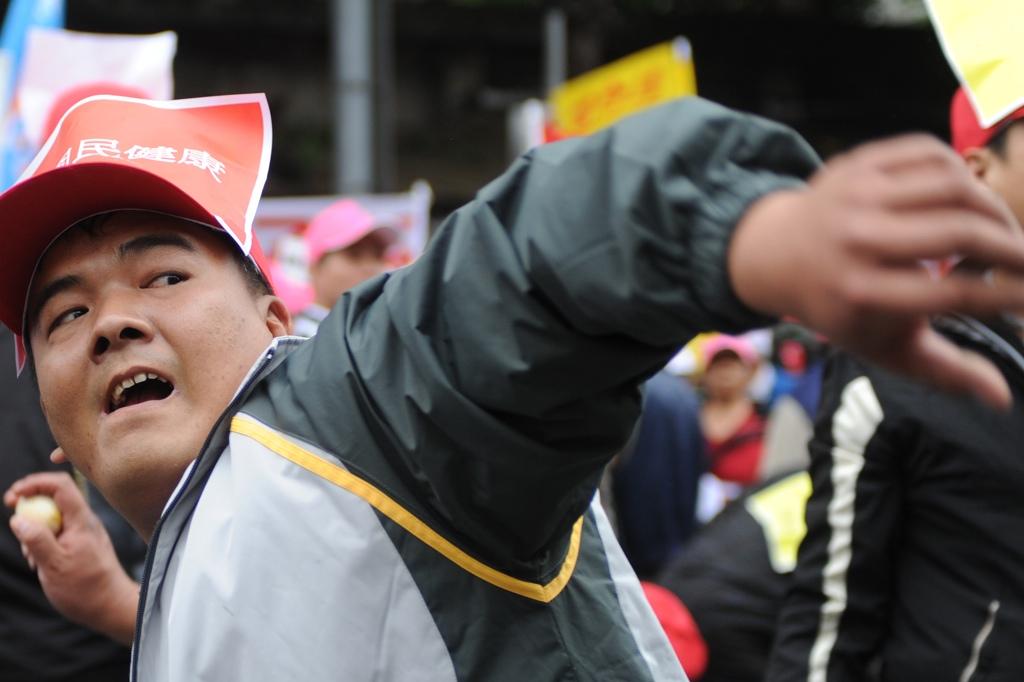Taiwan’s beef with the US
A farmer throws eggs during an anti-US beef demonstration in front of Parliament in Taipei on March 8. Washington has recently urged Taipei to ease restrictions on US beef, while some local officials have said that stalled free-trade talks between the two sides hinge on the issue.
TAIPEI, Taiwan — You would think that Uncle Sam had seen it all by now.
He’s been lynched, immolated, spat on, ripped apart, blown up and dragged through raging streets from Hanoi to Islamabad to Havana.
But a protest outside Taiwan’s Presidential Palace this week could well have marked the first time he’s had US beef hurled at him.
Protesters in the capital city of Taipei were enraged that President Ma Ying-jeou’s cabinet gave the green light to resume shipments of US beef laced with ractopamine, a meat leanness-enhancing drug that Taiwan deems unsafe for consumption.
The trade row underscores a deeply felt concern here that the US often bullies its politically marginalized ally into trade and political deals it doesn't want. This issue cuts across party lines and has sparked political introspection about whether the US is friend or opportunist.
“The US treats us like a trading partner booty call. I guess they think we’re that girl that you don’t really like, whose always hanging around,” said James Wang, a Taiwanese international relations student, who stood outside of the Presidential Palace on March 8, chucking ruby-red hunks of meat at a poster of Uncle Sam that reads: "I WANT YOU … TO EAT UNSAFE U.S. BEEF."
More from GlobalPost: Taiwan's nuclear nightmare?
Other signs read: “President Ma before the elections, puppet emperor after the election,” and “toxic beef jeopardizes health.”
“Want to sell outdated weapons? Give them to Taiwan, they’ll be grateful. Want to get rid of products that nobody else wants? Sell those to Taiwan too. They think we have to take it because we don’t have any friends. But is this how a friend should be treated?” asked Wang.
The long-simmering beef dispute has hindered US-Taiwan trade talks that are viewed as crucial to helping the isolated island compete in the global market.
After China, the US is Taiwan's biggest export market. Meanwhile, Taiwan is the US' 10th largest trade partner, according to Christopher Kavanagh, spokesman for the The American Institute in Taiwan (AIT), the de-facto US embassy in Taipei. The wealthy island is a top consumer of US beef, accounting for about $128 million of all US beef imports worth more than $26 billion.
But despite the rich ties between them, the US cut off talks in 2011 — in part because Taiwan turned away shipments of US beef containing ractopamine over fears they posed health risks to pregnant women, children and people with cardiovascular problems. The drug is also banned in China and the European Union; though Japan, South Korea and 100 other markets accept US imports with the additive.
The US is also reportedly blocking Taipei's attempts to join the Trans-Pacific Trade Partnership Agreement, which aims to lower trade barriers between nine Asia-Pacific nations.
More from GlobalPost: Occupy, Aussie-style
Removal of the ban would do away with a key barrier to trade relations, and the cabinet's move to do so on March 5 — which prompted opposition lawmakers to consider impeaching Premier Sean Chen, who backed the decision — is being seen as Taiwan submitting to US demands.
"They are treating Taiwanese people like fools," said opposition lawmaker Tsai Huang-lang, who accused Taipei of "dealing under the table" with Washington. “They don’t pressure China or the EU to take this beef — only us.”
AIT Director William Stanton said in a China News Agency interview this week that resolving the issue would “improve Taiwan's relations with the United States,” adding that the two sides could then resume trade talks. "If we can put the beef issue behind us, I think it would be a huge step forward."
While Washington and Taipei have been keen to downplay the notion that the US has forced Taiwan to capitulate on a widely unpopular issue, Taiwanese diplomatic insiders say that the cancellation of a trip to the island by the US Department of Commerce’s under secretary for international trade was a clear signal that Washington had grown “impatient with Taipei’s stance.”
Taiwan's foreign minister, Timothy Yang, denied being directly pressured by the US, but said: "The pressure is a feeling. We have understood too clearly the importance of Taiwan-US relations."
While Taiwan's cabinet shapes policy, the ban can only be officially removed following legislative approval. Analysts say Ma’s Kuomintang party, which has a sizeable majority in parliament, will have little trouble pushing through a review of the standard and turning away an opposition-backed no-confidence vote.
Insiders say that the Ministry of Health will likely allow ractopamine residues in beef of 2.5 to 10 ppb (parts per billion). The United States allows 30 ppb.
“Public health is the primary concern on leanness-enhancing drugs and the views of experts will be taken into consideration," said Health Minister Chiu Wen-ta.
Washington says ractopamine is safe. The AIT released two studies in the past six months in a bid to alleviate Taipei’s fears and eventually restart beef shipments.
Uncle Sam was named after Samuel Wilson, who owned a meat company that supplied beef to troops during the War of 1812. The story goes that the barrels were marked with a US stamp, but the soldiers would thank Uncle Sam for one of their few luxuries.
Perhaps James Wang and his fellow meat-chucking protesters would rather send the beef back where it came from.
More from GlobalPost: After Japan's tsunami, a multimedia series
